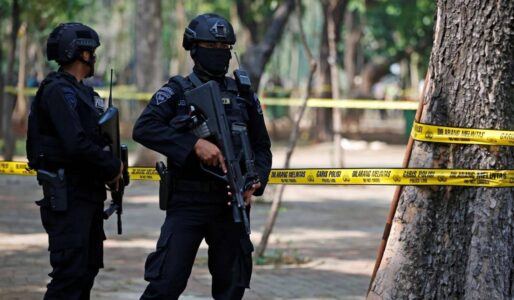
Islamic State affiliates in Indonesia actively recruiting people unhappy with pandemic policies
Indonesian affiliates of Islamic State (Isis ) are actively recruiting people during Covid-19 movement restrictions as they look to propagate a caliphate in the world’s most populous Muslim nation, according to analysts and a returnee from Syria.
Jakarta’s poor handling of the coronavirus pandemic has seen infections soar to 155,412, with 6,759 deaths, the highest fatality count in Southeast Asia.
Unemployment has spiked and more people in the informal sector – estimated to make up between 60 and 70 per cent of the economy – are struggling due to movement restrictions and low consumer spending over recession fears.
Public dissatisfaction has fuelled Isis’ propaganda efforts, according to Febri Ramdani, who went to Syria in 2016 to find 18 members of his family after they secretly left to live under the extremist group’s rule . Indonesia’s foreign ministry rescued Febri and his family in 2017.
“The people are a bit unhappy with the government’s handling of the pandemic, and this is the opportunity for extremist groups to come in with their propaganda that an Islamic state must be established … that it would solve all their problems and the pandemic would end,” said Febri, who was speaking after a webinar organised by the Centre for Radicalism and Deradicalisation Studies (PAKAR).
As people spent more time online during the pandemic, he feared that some – particularly young people who were lonely, in a state of confusion or jobless – would come across content spread by extremist groups.
“There is a need to cross check everything that you read on the internet. I did not do that when I was searching for my family in Syria,” said Febri, adding that he was “shocked, lonely and depressed” they had left without telling him.
Febri left for Syria not for ideological reasons, he said, but to see his mother again – and because he was drawn to Isis’ promises of jobs, health care and university education that he had discovered while looking online for information on the group.
“I believed what Isis promised, [but] there was nothing of that sort over there,” Febri said, adding that his family also felt “cheated”, hence their return to Indonesia.
But Isis affiliates in the country are also adopting a less technologically sophisticated form of recruitment, according to Robi Sugara, lecturer and counterterrorism analyst at Syarif Hidayatullah Islamic University, who moderated the webinar.
He said the groups had shifted away from using apps like Telegram due to efforts to restrict their presence. “They are now doing offline recruitment. They go from house to house to give Islamic studies, or sometimes they use mosques,” Sugara said.
He said Isis’ short-term aim was a jihad to kill Indonesian security forces or attack “infidel countries” to prove the militant group still existed. “Whenever there is an opportunity, they will attack.”
Isis currently has two factions in Indonesia . The largest faction, responsible for most of the major terror attacks in the country, is Jamaah Ansharut Daulah (JAD).
It is led by Aman Abdurrahman, who was sentenced to death in 2018. The other faction is Jamaah Ansharut Khilafah, led by Abu Husna.
Between June 1 and Aug 12, Indonesia’s police counterterrorism squad Detachment 88 arrested 72 terror suspects across 13 provinces, including Jakarta and Bali. Last June, a police officer was killed at a police station when a suspected member of JAD stabbed him with a samurai sword in south Kalimantan.
Experts are also worried about Isis’ efforts to recruit the next generation of extremists.
Khariroh Maknunah, director of the Institute of International Peace Building, is among those who warned that at least 15 children under the age of 17 had recently pledged their allegiance to Isis, adding that this was done online or through their fathers – who were either sympathisers or Isis members themselves.
All 15 were involved in terror activities, she said, and some had been convicted or jailed.
Mayolisia Ekayanti, programme manager at the Society Against Radicalisation and Violent Extremism, said the children of jailed militants were shown violent videos to radicalise them.
“Videos are effective tools to [make them] fight like their fathers,” she said. “These children are very young, some of them are 10 and below. They have no way of clarifying facts.”
This comes as a senior security source told This Week In Asia there were still more than 550 children of Indonesian Isis recruits in Syria.
Jakarta announced earlier this year that citizens who had left to join the group would not be repatriated, but young children could be considered. None have been brought home so far, however.
“Some of the children are younger than 10 years old,” said the security source.
Zachary Abuza of the Washington-based National War College said the figure was higher than previous estimates, and the implications were serious.
“What to do with them should their parents agree to voluntary returns – should they be detained? Put through a disengagement programme? If so, run by whom? Who pays for it?” he asked, adding that it was tragic many of these children were stuck in camps in Iraq and Syria “through no fault of their own”.
“Even before the Covid-19 pandemic, returns [to Indonesia] had slowed due to the ongoing war, exacerbated by the United States’ pull-out from the Kurdish region in northern Syria,” he said.
“One certainly should be concerned that the longer the children are there, the growing sense of frustration, that they will be radicalised themselves.”
Syrian returnee Febri said it was much better for Indonesian Isis recruits to be repatriated rather than them trying to return home undetected.
“They could then carry out attacks. If they are repatriated, they could be controlled and monitored,” he said. “Those who are violent could be jailed. Those who are not so radical could undergo deradicalisation programmes.”
Source: Asia One





